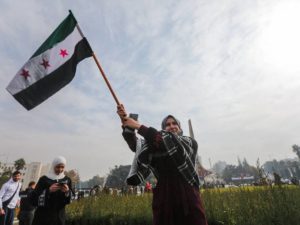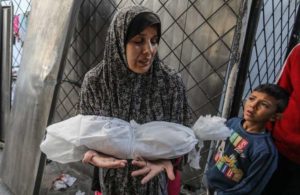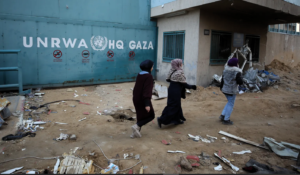Introduction
Armed conflict is driving more and more people from their homes. People also flee to escape the lack of human security linked to structural violence, persecution and oppression. The total number of people uprooted against their will reached a record 68.5 million in 2018 according to the UN High Commissioner for Refugees (UNHCR). Upward trends are set to continue given geo-strategic power shifts, climate change, the prevalence of unregulated warfare and the dynamics of the global arms trade.
Approximately 85% of the world’s refugees are hosted in low-income countries. In recent times, almost 70% of those in need of refuge fled Syria, Afghanistan, South Sudan, Myanmar and Somalia. The vast majority of the global refugee population is hosted in neighbouring countries such as Turkey, Pakistan, Iran, Uganda, Bangladesh and Lebanon. Turkey has the world’s largest refugee population with 3.5 million: one in every 23 people is a refugee. Lebanon shelters the largest number of refugees relative to the size of its population: one in 4 people is a refugee. UNHCR data indicates that a mere 14.1% of the world’s refugees (including pending asylum cases) were hosted in the European Union (EU) in 2018.
In 2015, many Europeans spontaneously expressed their solidarity with the Syrians, Afghans, Iraqis, Eritreans and others seeking shelter in Europe. Many EU politicians and others persist in referring to a “migration crisis” although the actual number of people seeking refuge today is well below that of 2015. Civil society actors must now contend with a toxic narrative and official state-sponsored policies that endanger those seeking refuge. The EU has invested in an extensive securitization programme to deny entry to individuals who have a right to seek asylum when their lives depend on it. The externalization of the EU’s security policies affects people compelled to leave their homes well before they reach Europe’s formal borders. The human cost of the EU’s arrangement with Libya, for example, is shocking. Documented accounts of torture, sexual abuse and slave-like conditions in detention centres, including deaths and disappearances, have been frequently reported. But the harmful effects of EU policies also extend deeper into the Sahel, for example to Niger, Mali and Chad where the EU is negotiating aid packages in exchange for measures to restrain migration. While these policies affect people who are on the move for a range of complex reasons, it is ever more obvious that a narrow interpretation of the 1951 UN Refugee Convention and its 1967 Protocol is inadequate in the context of rapid globalization, growing inequality, marginalization and erosion of the world’s rule-based order.
EU policies include a criminalization agenda that denies the humanity of those fleeing war-zones and widespread persecution. The EU has thwarted the efforts of search and rescue operations in the Mediterranean where untold numbers have perished in recent years. On land, the EU and its member states have pursued a raft of measures to obstruct support for people in need of refuge. Such measures include intimidation, misinformation on the motives and practices of people involved in humanitarian work, allegations of disruptive behaviour and the arrest of NGO staff and individuals accused of smuggling or facilitating illegal entry to the EU.
The dehumanization of asylum seekers and others in need of safety led United Against Inhumanity (UAI) to commission research to gain an improved understanding of the EU’s criminalization agenda and its implications from a humanitarian perspective. This note sets out the context and the issues analysed in Sarah Hammerl’s report: Asylum Criminalisation in Europe and its Humanitarian Implications. It identifies some of the measures UAI plans to pursue in collaboration with concerned stakeholders to challenge the harm inherent in EU policies.
EU: Criminalization and Resistance
Sarah Hammerl’s report shows that the EU and various Member States have pursued an agenda to deter the arrival and mobility of people who are denied formal legal means to seek asylum. It is worth noting that individuals who meet refugee criteria that are clearly defined in international law – a well-founded fear of being persecuted for reasons of race, religion, nationality, membership of a particular social group or political opinion – are de facto refugees whatever the circumstances or time it takes for national authorities to undertake their status determination procedures. Moreover, a case can be made that the current practice of the EU in terms of status determination does not fully comply with its obligations under the Refugee Convention. It clearly states that if a country where asylum is requested does not meet its obligations under international customary law, individuals can seek proper status determination in a neighbouring country.
The vast majority of people who seek refuge in a country close to their country of origin do so without undergoing individual status determination. This contrasts sharply with Europe and other western countries that for decades championed, at least rhetorically, the international refugee convention as well as respect for human rights in general. The demise of the Cold War and related geo-strategic agendas have seen a re-calibration of the stance of various Western states vis-à-vis the laws and mechanisms put in place after World War II to safeguard refugees in need of international protection.
The EU asylum criminalization agenda affects humanitarians and others such as captains of vessels operating in the Mediterranean where the international law of the sea and the refugee convention apply. These treaties oblige the rescue of people at risk of drowning and not transporting them to places such as Libya where individuals are trafficked, tortured and held in cruel and degrading detention centres that endanger their very survival. Humanitarians involved in search and rescue operations and the provision of life-saving support have also been harassed, intimidated and treated as criminals.
Instead of acknowledging and respecting the human rights that are integral to all human beings the EU has chosen to demonize and criminalize people seeking refuge. In the process it has denied the humanity of people obliged to flee situations of dire distress that are often, in part, the outcome of EU policies and arms trade practices that fuel wars and political upheaval in locations such as Afghanistan, Libya, Syria and Yemen. As noted by Professor Alessandro Spena of Palermo University, “there is an inherent contradiction between the EU’s deterrence policies and its professed commitment to human dignity, human rights, freedom, democracy, equality and the rule of law.” Indeed, it is difficult to align the EU’s responsibility in the death, torture, rape and inhuman treatment of asylum seekers coupled with its smear campaign of search and rescue programmes with the claim that it supports and respects core ethical values.
The rise of hostile rhetoric towards asylum seekers that portrays them as an existential threat tends to crowd out the work of citizens and organized civil society groups opposed to racist xenophobia and to the deaths that make the Mediterranean a deep blue grave for the many who have drowned while attempting to reach Europe.
Criminalization: what is to be done?
UAI’s indignation with Europe’s ruthless treatment of people struggling to escape unconscionable situations was the trigger for this report. It is of great concern that the EU and various member states have invested heavily in agendas and narratives that demonize and demean fellow human beings who, as a result, are confronted with additional risks that put their lives in danger. It is equally of concern that humanitarian personnel, citizens and others who strive to rescue and assist people facing life-threatening problems are criminalized and subjected to smear campaigns aimed at thwarting assistance programmes and solidarity initiatives.
It is evident that the EU asylum system is broken and that the Dublin Regulation must be substantially reformed with the aim of securing fair and transparent responsibility-sharing among EU member states for those seeking refuge. UAI is committed to countering the ongoing erosion of the global asylum regime and the way in which people in need of security and refuge are abused and criminalized. UAI is equally committed to working with one and all who share its concern about the inhumanity of the perspectives, policies and practices that treat people fleeing war and persecution as individuals who are not worthy of mutual respect and human dignity. Unless there is a collective endeavour to change these toxic narratives – through evidence-based research and advocacy – public opinion will not be swayed.
UAI is now disseminating the “Asylum Criminalisation in Europe and its Humanitarian Implications” report and welcomes feedback on its findings and conclusions. Ideas and proposals on how to advance an anti-criminalization agenda are warmly encouraged.
To access the Briefing note in PDF click here.
To access the report in PDF click here.











